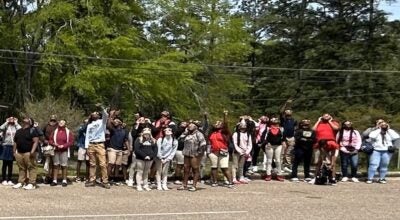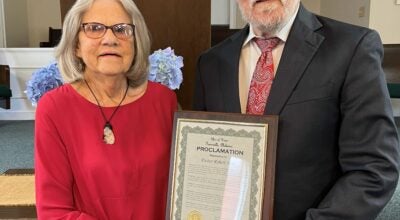An in-depth look at Nov. 6 amendments
Published 9:48 am Thursday, November 1, 2012
In addition to voting for local, state and national candidates next Tuesday, Alabama voters will also have to tackle 11 amendments on the ballot.
The amendment summaries as they appear on the ballot are printed, and the amendments can be read in full in the Legal section of The Luverne Journal.
Amendment 1 (SB 369): Proposing an amendment to the Constitution of Alabama of 1901, relating to the Forever Wild Land Trust, to reauthorize the trust for a 20-year period. (Proposed by Act No. 2011-315)
The Forever Wild Land Trust was established in 1992, and according to alabamaforeverwild.com, the program has purchased more than 227,000 acres of land in the state for public use.
The land is managed by the Alabama Department of Conservation and Natural Resources through divisions like State Lands, State Parks, and Wildlife and Freshwater Fisheries.
Forever Wild’s website says that 220 miles of recreational trails within 21 new recreation areas and nature preserves have been created, along with additions to 10 State Parks and 17 Wildlife Management Areas.
The program is primarily funded through the interest earned from natural gas royalties, along with Forever Wild Land Trust license plate revenues and grant competitive proposals to match state funds to federal funds.
Amendment 2 (HB 12): Proposing an amendment to the Constitution of Alabama of 1901, as amended, to allow issuance by the State from time to time of general obligation bonds under the authority of Section 219.04 and Section 219.041 to the Constitution of Alabama of 1901, as amended, so long as the aggregate principal amount of all such general obligation bonds at any time outstanding is not in excess of $750 million. This amendment would replace the maximum aggregate principal limitations currently contained in said Sections 219.04 and 219.041. The proposed amendment would also allow issuance by the State of general obligation refunding bonds under the authority of Sections 219.04 and 219.041 to the Constitution of Alabama of 1901, as amended, subject to certain minimum savings thresholds and limitations of maximum average maturity. (Proposed by Act No. 2012-567)
Governor Robert Bentley told the Associated Press in early October that the amendment would allow for improved economic development incentives, which would assist in creating more jobs.
Alabama GOP chairman Bill Armistead said that while the Republican party hasn’t officially taken a position on any of the amendments, he personally is in favor of this amendment.
“We’ve done a good job recruiting industries, and we started aggressively bringing in industry with Mercedes and continuing with Hyundai, Honda and others,” he said. “I think changing this would allow us to create more incentives.”
The AP reported that the proposed amendment made it through the Alabama State Legislature in May with only three votes against it.
Amendment 3 (HB 588): Relating to Baldwin County, proposing an amendment to the Constitution of Alabama of 1901, to define the Stockton Landmark District within the county and to prohibit the annexation by local law of any property within the district into any municipality. (Proposed by Act No. 2011-316)
Amendment 4 (SB 112): Proposing an amendment to the Constitution of Alabama of 1901, to repeal portions of Amendment 111, now appearing as Section 256 of the Official Recompilation of the Constitution of Alabama of 1901, as amended, relating to separation of schools by race and to repeal Section 259, Amendment 90, and Amendment 109, relating to the poll tax. (Proposed by Act No. 2011-353)
This amendment removes language in the Alabama Constitution related to poll taxes and segregated schools.
Proponents of the measure say that it will have no effect other than to remove outdated language, however the Alabama Education Association has concerns.
The AEA’s website says its lawyers believe that changing sections of the Constitution would reinstate a portion of the document that removes the state’s obligation to provide public education.
The AEA believes that such a measure could provide leverage to reduce funding to education, but there has been no court ruling on the matter.
Amendment 5 (SB 466): Proposing an amendment to the Constitution of Alabama of 1901, to provide for the transfer of the assets and liabilities of the Water Works and Sewer Board of the City of Prichard to the Board of Water and Sewer Commissioners of the City of Mobile, presently known as the Mobile Area Water and Sewer System. (Proposed by Act No. 2011-543)
Amendment 6 (HB 60): Proposing an amendment to the Constitution of Alabama of 1901, to prohibit any person, employer, or health care provider from being compelled to participate in any health care system. (Proposed by Act No. 2011-617)
This amendment is intended to block President Obama’s Affordable Care Act, which was passed in 2010.
Even if the amendment passes, some experts say it’s unclear whether or not it will have an effect since the Supreme Court has since ruled on the Affordable Care Act.
“Federal law has supremacy over state law,” Timothy Jost, a law professor at Washington and Lee University told the Anniston Star last week.
Amendment 7 (HB 64): Proposing an amendment to the Constitution of Alabama of 1901, to amend Amendment 579 to the Constitution of Alabama of 1901, now appearing as Section 177 of the Official Recompilation of the Constitution of Alabama of 1901, as amended, to provide that the right of individuals to vote for public office, public votes on referenda, or votes of employee representation by secret ballot is fundamental. (Proposed by Act No. 2011-656)
While this amendment appears to affirm citizens’ rights to a secret ballot, the “employee representation” phrase is key.
Rep. Kurt Wallace of Maplesville, who sponsored the bill, told the Associated Press that the measure should curb labor unions from harassing employees to sign a card check.
A union can be formed by having more than half of the employees to sign a card asking for a union, the AP reports. This amendment would make the formation of a union by secret ballot only.
Amendment 8 (HB 276): Proposing an amendment to the Constitution of Alabama of 1901, to repeal the existing provisions for legislative compensation and expenses and establish the basic compensation of the Legislature at the median household income in Alabama; to require legislators to submit signed vouchers for reimbursement for expenses; and to prohibit the Legislature from increasing the compensation or expenses payable to its members. (Proposed by Act No. 2012-269)
Amendment 8 has been one of the more publicized amendments, and it pertains to cutting the pay of Alabama’s legislators.
Sen. Bryan Taylor helped form the bill, and he said that the measure would mean a pay cut of over $8,000 for legislators.
The amendment ties legislators’ pay to the Alabama median income, which was $41,415 last year.
“That amendment would reduce their pay, and to me, that’s a fair way to do it,” said Armistead.
Amendment 9 (HB 357): Proposing an amendment to the private corporation provisions of Article 12 of the Constitution of Alabama of 1901, to become effective January 1, 2014, to continue the authority of the Legislature to pass general laws pertaining to corporations and other entities; to continue the authority of the Legislature to regulate and impose a business privilege tax on corporations and other entities; and to repeal various provisions concerning private corporations, railroads, and canals. (Proposed by Act No. 2012-275)
WBHM, a radio station sponsored by the University of Alabama-Birmingham, reports that this amendment updates language from the Constitution concerning different types of corporations, which have expanded since the Constitution was first written.
It would also allow the legislature to impose a business privilege tax on corporations.
Amendment 10 (HB 358): Proposing an amendment to the Constitution of Alabama of 1901, effective January 1, 2014, to amend Section 247 relating to the authority of the Legislature concerning banks and banking, to repeal various other provisions of Article XIII concerning banks and banking; and to repeal Amendment 154 to the Constitution of Alabama of 1901, now appearing as Section 255.01 of the Official Recompilation of the Constitution of Alabama of 1901, as amended, subject to the contingency that a new Article XII of the state constitution is adopted that repeals existing Section 232 of the state constitution, and subject to the contingency that Sections 10A-2-15.01 and 10A-2-15.02, Code of Alabama 1975, are repealed. (Proposed by Act No. 2012-276)
This is another language-updating amendment pertaining to banks, said First Citizens Bank President William Petrey.
“It cleans up some old stuff from the Constitution that still talks about paying back in gold and silver,” he said. “Obviously that hasn’t been done in years.”
Petrey said the measure also cleans up the State Banking Department and mandates that the legislature can’t open a bank or bail out a bank, such as what happened nationally in recent years.
“We don’t want our state to go bankrupt over being in the banking business and giving bad loans,” he said. “If we make a sorry loan, then we pay for it here at the bank. The taxpayer doesn’t.”
Petrey said the amendment is being supported by First Citizens, the State Banking Department and other banks across the state.
Amendment 11 (HB 404): Relating to Lawrence County, proposing an amendment to the Constitution of Alabama of 1901, to prohibit any municipality located entirely outside of Lawrence County from imposing any municipal ordinance or regulation, including, but not limited to, any tax, zoning, planning, or sanitation regulations, and any inspection service in its police jurisdiction located in Lawrence County and to provide that a municipality prohibited from imposing any tax or regulation under this amendment shall not provide any regulatory function or police or fire protection services in its police jurisdiction located in Lawrence County, other than public safety mutual aid. (Proposed by Act No. 2012-308)





